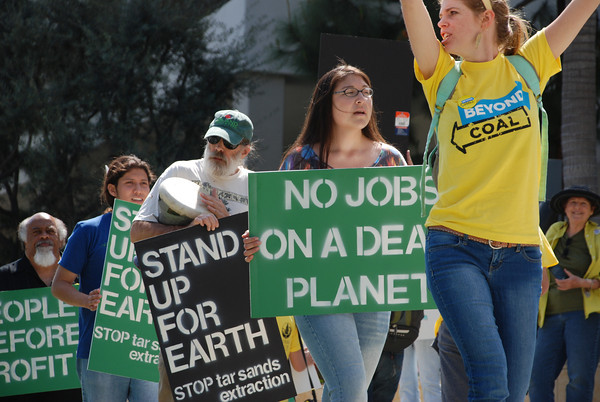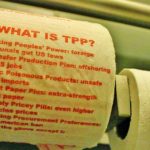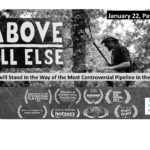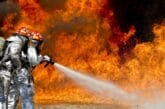Recently, President Obama approved construction of the southern portion of the Keystone XL Pipeline. However, by not approving the whole pipeline the President has once again put special interests ahead of American job creation and energy independence. The President’s policies are no longer just failing to give us the recovery he promised-they are actively destroying new jobs for American workers. –Rep. Howard P. “Buck” McKeon, R-California
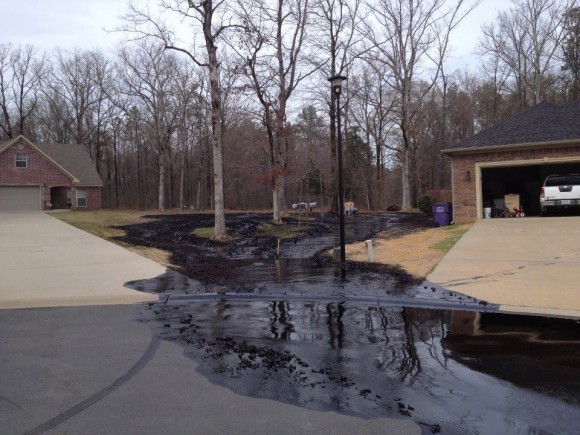

Josh Fox, the creator of the whistle-blowing documentary that made flaming faucets famous, “GasLand,” made a sequel short film called “The Sky is Pink.” In it he chronicles the difference between “investigative” journalism and “he said/she said” journalism. It is available for your viewing pleasure here. http://vimeo.com/44367635
Inspired, I’ve decided to textually mimic his process. I will respond as directly and as frequently as possible to writing that I find dangerously, willfully misleading.
Now, Congressman McKeon, Let’s Talk Tar Sands
By Peter Jefferson Nichols
Dear Howard P. “Buck” McKeon,
I received your letter in response to my earlier note imploring you to do all you can to prevent the completion of the Keystone XL Pipeline. Your words express your intent to do exactly the opposite of what I had asked. And to be frank, your words piss me off.
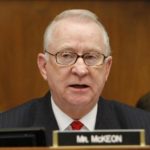

Here’s the logic underpinning my anger:
- You present equivalence where there is obvious incongruence.
- You support your assertions with evidence of dubious legitimacy.
You write, “President Obama approved construction of the southern portion of the Keystone XL Pipeline.” That is true.
Here are some other truths.
- For a pipeline to be constructed across an international border, the President must issue a “presidential permit.”
- On March 14, 2008 the U.S. Department of State issued a permit, signed by then President George Bush, to TransCanada Keystone Pipeline, LP (TransCanada). That permit authorized the “construction, maintenance and operation of facilities at the United States and Canada border to transport crude oil between the two countries.[1] It cleared the way for what is now commonly known as the Keystone 1 Pipeline that stretches from Hardisty, Alberta, to U.S. Midwest markets at Wood River and Patoka, Illinois, and to Cushing, Oklahoma
- On January 18, 2012 The U.S. Department of State, under the auspices of Barack Obama, denied a permit application submitted by TransCanada Keystone Pipeline, LP (TransCanada).[2] The corporation had hoped to build a larger version of the Keystone 1 artery. That larger version was and is known as the “Proposed Keystone XL Project.”
- On February 27, 2012 TransCanada sent a letter to the U.S. Department of State (D.O.S.) informing the Department of the company’s plans to re-file a Presidential Permit application for the Keystone XL Project. The letter also informed the D.O.S. “What had been the Cushing to U.S. Gulf Coast portion of the Keystone XL Project has its own independent value to the market place and will be constructed as a stand-alone Gulf Coast Project, not part of the Presidential Permit process.”[3]
The Difference Between Official and Unofficial Approvals
On March 22, 2012, President Obama made a speech in Cushing Oklahoma. In that speech he said “Now, right now, a company called TransCanada has applied to build a new pipeline to speed more oil from Cushing to state-of-the-art refineries down on the Gulf Coast. And today, I’m directing my administration to cut through the red tape, break through the bureaucratic hurdles, and make this project a priority, to go ahead and get it done.”[4]
Buck, am I correct in concluding that you interpret Mr. Obama’s speech in Cushing as an “approval?” I think I’m right.
Buck, after that earlier sentence of yours I quoted, you write: “However, by not approving the whole pipeline, the President has once again put special interests ahead of American job creation and energy independence.”
Buck, do you see how you’ve presented an equivalence where there is obvious incongruence? You make out the President’s actions to be inconsistent and irrational. And I might agree with you. He certainly is using deceptive rhetoric in saying “I’m directing my administration to cut through red tape.” The letter his administration received shortly after February 27, 2012, presumably it wasn’t sent same-day mail, clearly stated that there was no tape to be cut regarding the Gulf Coast Project. That project did not cross an international border and so did not require a presidential permit.
So, Buck I hope you understand the difference, a difference our own chief executive may be befuddled by, between an oral approval of a domestic pipeline project, a project that the president has no authority over, and a signed, an “approved,” presidential permit.
A Question of American Jobs in the Pipeline Industry
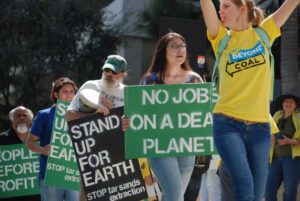

Now to delve into the second cause of my displeasure… You write “Even House Democrats wrote a letter to President Obama saying that this project would create 20,000 direct jobs and spur the creation of 118,000 spin-off jobs.” Yes that letter got written.[5] But that letter dated October 19, 2011, which you say came from “House Democrats” was signed by only 22 Democratic Party representatives out of a possible 193. What is more, those 22 representatives failed to offer any sourcing for their claim of 22,000 direct jobs and 118,000 spin-off jobs. I smell a willfully misleading myth.
Hey, read this:
In 2008, a report included in TransCanada’s Presidential Permit application for Keystone XL to the State Department said they anticipate “a peak workforce of approximately 3,500 to 4,200 construction personnel” to build the pipeline. In 2010, TransCanada put out a press release that said, “During construction, Keystone XL would create 13,000 jobs and further produce 118,000 spin-off jobs.” In 2011, TransCanada put out a fact sheet that said Keystone XL would “create about 20,000 construction and manufacturing jobs.”[6]
Me thinks I found the source of those House Dems claims: TransCanada. Those crooked canucks lent themselves the appearance of legitimacy, an appearance that may explain why those inflated numbers have fooled some, by commissioning a firm named the Perryman Group to publish a report titled “The Impact of Developing the Keystone XL Pipeline Project on Business Activity in the US.”[7] That report is flawed. It redefined the KXL project to include a portion of the Keystone 1 pipeline, a 298-mile portion from Steele City, Nebraska to Cushing, Oklahoma that was built in 2010. A portion that went fully in-service in February 2011. That redefinition results in a report that includes more than $1billion in prospective spending (read job creation) that has already occurred. [8]
The Global Labor Institute of Cornell University, an establishment with a reputation for intellectual acuity that ought to drub the Perryman Group’s, put out a report titled “Pipe Dreams? Jobs Gained, Jobs Lost by the Construction of Keystone XL.”[9] On page 25 of that document it reads “Based on TransCanada’s own figures provided to the Canadian government, operating costs for the U.S. section of their pipeline are minimal, and new permanent American jobs created would likely be as few as 50.” Eeeek!
The Impossible Quest for US Energy Independence
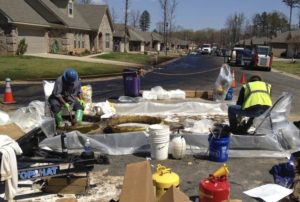

But I’m going to move along to this load of excrement you saw fit to share:
The United States at the present time imports more than half of the oil it consumes. While a significant portion of these imports comes from allies, such as Canada and Mexico, much comes from countries hostile to the United States. These trade relationships leave our country vulnerable to disruptions in oil supply created by geopolitical turmoil. Furthermore, increase in oil consumption in the developing world has brought higher oil prices. Increasing imports from Canada could limit the vulnerability of the United States to increased oil prices and shortages in supply. — Rep. Buck McKeon
When you wrote the first sentence of that paragraph, it may have been true. Now it may not be, according to The U.S. Energy Information Agency, U.S. crude oil production will exceed U.S. crude oil gross imports as early as the end of 2013.[10] Yet what confuses me is why you think the Keystone XL Pipeline, if it were completed, would reduce reliance on “countries hostile to the United States.” The most recent government data shows that the Gulf Coast refineries are exporting 60 percent of their annual production of gasoline and 42 percent of their annual production of Diesel.[11] So it stands to reason that a significant portion, maybe even more than half of any Tar Sands that make their way to Texas, won’t wind up being burned in American combustion engines, but in foreign ones. And that means higher prices at American Gas Pumps.
Here’s a quote from someone you should read more of:
At the moment, there’s an oversupply of tar sands crude in the Midwest, which has depressed gas prices there. If the pipeline gets built so that crude can easily be sent overseas, that excess will immediately disappear and gas prices for 15 states across the middle of the country will suddenly rise. Says who? Says the companies trying to build the thing. TransCanada Pipeline’s rationale for investors, and their testimony to Canadian officials, included precisely this point: removing the “oversupply’ and the resulting “price discount” would raise their returns by $2 to $4 billion a year.[12] — Bill McKibben
McKibben’s last sentence sounds a clear indictment of TransCanada’s pipeline being a vehicle to further, as you write, “special interests ahead of American job creation and energy independence.”
A Country Vulnerable to Tar Sands Spills
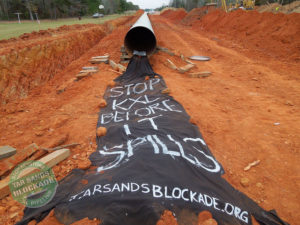

Moving on, Buck, your words represent you as being genuinely concerned for the vulnerability of America. Well that pipeline you support would increase our susceptibility, decrease our property values and up our insurance rates, all pipelines leak! Especially when they are transporting Tar Sands. The Keystone 1 ruptured 12 times in its first year of operation.[13] Last week Exxon’s Pegasus Pipeline, which transports the same thing The Keystone XL would, suffered a 22-foot split which spilled upwards of 5,000 barrels of toxic liquid into the North Woods Subdivision, an Arkansas suburb.[14] In 2010, a pipeline in Michigan burst and pumped 20,000 barrels of Canadian Heavy Crude into the Kalamazoo River system.[15] The EPA and Enbridge estimate cleanup costs alone for that disaster at over $800 million (and counting), and that’s to say nothing of the economic losses suffered by the affected region
The cause of those spills and the expense of cleaning up after them, relates to the corrosive nature of their contents. They do not transport Crude Oil, a liquid under normal atmospheric pressure and temperature, as you know it but something entirely other. They transport a derivative of Tar Sands.
Tar Sands when first mined, are the consistency of peanut butter. Peanut Butter doesn’t flow and neither do Tar Sands. So they are diluted with chemicals and heated prior to passing through any pipe. When the piped substance, usually called dil-bit or syn-crude, is exposed to air it cools and the chemicals evaporate. What is left is a dense substance that sinks to the bottom of the water table. It is very hard to clean up the bottom of the water table. In fact, it is impossible
What is even more outrageous is that through a loophole, corporations transporting Tar Sands products through pipelines are not required to pay the 8-cents-per-barrel fee into the federal Oil Spill Liability Trust Fund, which is mandatory for all those transporting traditional crude.[16] Thus any expenses resulting from a spill are put on the tab of local governments.
The Story of Fossil Fuel Carbon, A Climate Going Haywire
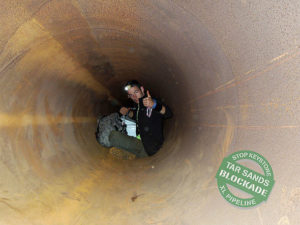

I’ve got three more points to make and then I’m going to bid you farewell.
- I’ve yet to mention Climate Change. Have you seen the Hockey Stick Graph?[17] Are you aware that there is currently a streak of 336 consecutive months of global temperatures above the 20th century average.[18] That means that I have never experienced a cooler than average month. I’ll be 27 in May. Did you hear that this past summer Artic sea ice melted to the smallest size ever recorded?[19] Have you noticed food prices going up because of the shortages that have resulted from the drought, the worst one in more than half a century, which tortured farms in the contiguous United States last summer?[20] By chance did you read the National Hurricane Center damage estimate for Sandy? $50 billion, second only to Katrina’s $108 billion.[21] This list of horrors could go on and it will get more terrifying, unless dramatic action is taken. 80% of the world’s known Fossil Fuel Reserves must never be burnt.[22] If we are to remain below global warming of more than 2°C, almost every government in the world has agreed that anything higher than that would be “unsafe.”[23]
- I know that you have accepted almost $100,000 in donations from fossil fuel companies.[24] I know that that is almost four-fifths below the average of the rest of the House of Representatives. You should know that facts like that make it nearly impossible for people like me to trust government officials to do what is necessary to avert catastrophe. It is numbers like those that have inspired nearly 60,000 people to pledge to “engage in serious, dignified, peaceful civil disobedience” that could get them arrested should that be what is necessary prevent the Keystone XL Pipeline from being built.[25]
- Should this note have changed your mind about the merits of TransCanada’s business practices, there is an open public comment period, which will conclude on April 22, for the State Department’s Environmental Impact Review on the proposed project. Send your remarks, your objections, to keystonecomments@state.gov. If you wish to do more after that, consider donating heavily to the bail money fund of the Tar Sands Blockade.
Farewell Buck,
Peter Jefferson Nichols
[11] http://priceofoil.org/2013/03/14/keystone-xl-refineries-already-exporting-60-percent-of-their-gasoline/
[12] http://thehill.com/blogs/congress-blog/energy-a-environment/211733-bill-mckibben-founder-350org
[14] http://www.ibtimes.com/exxon-oil-spill-epas-official-photos-show-full-extent-damage-pegasus-pipeline-mayflower-ark-1177083
[16] http://desmog.ca/2013/04/02/pipelines-carrying-tar-sands-crude-us-don-t-pay-federal-oil-spill-fund
[20] http://www.nytimes.com/2012/09/05/business/experts-issue-a-warning-as-food-prices-shoot-up.html
[23] http://www.worldbank.org/en/news/press-release/2012/11/18/new-report-examines-risks-of-degree-hotter-world-by-end-of-century

